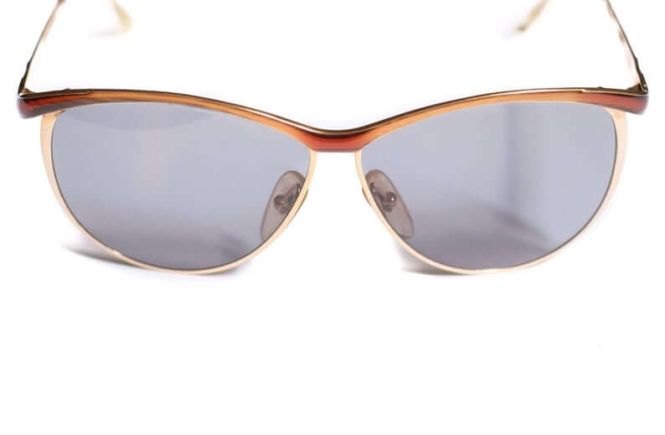[vc_row][vc_column][vc_message]Niche : Personalized Design
Shop link : https://www.etsy.com/uk/shop/EyewearYounique
Instagram : https://www.instagram.com/eyewearyounique
Website : https://eyewearyounique.com[/vc_message][/vc_column][/vc_row][vc_row][vc_column][vc_column_text]
Tell us something about yourself, how did you get started, do you consider yourself a crafter, maker, artist…
It all started with one pair of vintage Christian Dior sunglasses, and I was hooked. Having grown up in a family of optical professionals with my father as an optician and my grandfather as an eye surgeon, it’s no surprise that at the tender age of 15 years old I found myself stumbling across a stored-away and seemingly forgotten-about collection of designer vintage glasses and sunglasses. Being young and too curious for my own good, I began peeling back layers of dust to reveal a couple of different pairs of vintage Christian Dior sunglasses dating from the 70s and 80s. I was in awe. Their elegance, charm, and at times frankly obnoxious styles captivated my imagination. It felt so wrong that such iconic designer vintage glasses and sunglasses – cultural artifacts – be boxed up for no one to enjoy. I couldn’t help but wonder how many other people would share in my somewhat unusual fascination, so I decided to put it to the test. At that moment, I took no time to dust off the box of glasses and give them a new lease of life, beginning my own collection to cast light on the unique charm of vintage eyewear. A handful of years later, and I’m proud to say that my initial curiosity has resulted in Eyewear Younique having shipped to over 20 different countries, sharing in the appreciation of luxury vintage eyewear with hundreds of people around the globe.
How did you discover Etsy? Did you have any previous experience in selling handmade products? Why did you start selling online?
With a focus on vintage and handmade items, it seemed appropriate that my growing collection of vintage glasses and sunglasses be showcased on Etsy. When I came across Etsy in 2013 at the age of 15, naturally I had very little prior previous experience in selling, let alone handmade or vintage glasses and sunglasses. However, with plenty of organic traffic and love for my product, it seemed that a platform such as Etsy would be a good entry point for an inexperienced yet hungry individual with a drive to showcase a newly found hobby. If it also meant earning a small bit of pocket money on the side, that would be no bad thing. I soon realized the benefits of selling online. Primarily, I saw enormous value in being able to engage with a global customer base, somewhat offsetting the niche nature of luxury vintage eyewear.
What products do you sell, what type of materials are used in your creations, how do you design your products, what makes your products stand out?
The theme that has always run throughout my Etsy shop is, and always will be, luxury vintage glasses and sunglasses. Sticking with a neatly-defined and niche product category has allowed me to carve out a reasonably strong brand within the space, and an emerging reputation as specialists in the field. While I don’t design my products myself, I do individually handpick each pair of glasses and sunglasses, ensuring that each pair complies with the collection both stylistically and with regards to the quality of finish. It’s this timely selection process that ensures each pair of glasses or sunglasses on our website stands-out in its own regard. I realized that business is a great deal easier when you’re working with the very best products on the market. This profound but simple realization allowed me to focus less on selling, and more on showcasing, allowing the product to sell itself.
[/vc_column_text][/vc_column][/vc_row][vc_row][vc_column width=”1/3″][vc_single_image image=”100002280″ img_size=”737×737″ onclick=”link_image” css_animation=”appear” bb_tab_container=””][/vc_column][vc_column width=”1/3″][vc_single_image image=”100002279″ img_size=”737×737″ onclick=”link_image” css_animation=”appear” bb_tab_container=””][/vc_column][vc_column width=”1/3″][vc_single_image image=”100002278″ img_size=”737×737″ onclick=”link_image” css_animation=”appear” bb_tab_container=””][/vc_column][/vc_row][vc_row][vc_column][vc_column_text]
How was your experience in learning to craft, are you self-taught or did you have a mentor, how long did it take for you to be satisfied with your creations?
While I don’t make the glasses and sunglasses myself, there’s a lot to learn when it comes to eyewear from setting up frames with prescription lenses to making adjustments for the fit. Fortunately, I was able to learn a lot of this from my Dad, benefitting from his optical background and experience of over 30 years as a professional optician. As with learning any new skill, it took some time to get my head around the basics. However, with access to excellent mentors as well as access to the internet to learn the basics of running an online business, I was up and running in a relatively short space of time. Trial and error will always be a big part of the learning process, and it was no exception for me in the early days. Fortunately, I was prepared to jump in headfirst and allow the ego to take a hit at times, knowing that ‘you don’t have to be great to get started, but you have to get started to eventually become great.’
What was your original goal when you opened up an Etsy shop? What impacted your decision to start selling online? Do you consider online selling as a side-job, full-time job, or extra income to pay for your hobby?
As a youngster living at home with my parents, I had little to no expenses or financial requirements when I started my Etsy shop. Therefore, my goals and reasons for opening my online business were not fuelled by financial motives, but instead a desire to build something exciting from scratch. As I moved through university, these motives changed slightly as I began to enjoy the financial independence of not having to ask my parents to subsidize my lifestyle. While I certainly don’t view my online business as a full-time job, I do see it as a useful additional stream of income that has become, at times, invaluable.
Did you have any fears or reservations before opening up your Etsy shop? Were you worried about profitability or product competitiveness? What are some concerns and questions you had before you got started? How did you overcome them?
Call it naivety, but at the age of 15, there was little doubt running through my mind as to whether this would or wouldn’t work. Living at home, my lifestyle and that of others didn’t hinge on my success, so I threw myself into the process of opening an Etsy shop with zero hesitation. Initially, my desire to showcase my superb collection of vintage glasses and sunglasses was primary, and my ability to compete in the marketplace was very much secondary. Looking back now, I firmly believe that these intentions, alone, provided me with a competitive advantage without really knowing it. My passion for the product was authentic and could be felt from the customer’s perspective, which, in a community of buyers such as those on Etsy, is valued far more than the motive of selling for the purpose of making as much money as possible.
How long did it take for you to get your first sale? Did you ever think you would make a lot of sales in the first year? What was the goal you were hoping for? How many sales an average you get per week?
Funnily enough, my lack of business acumen in the early days resulted in a pricing strategy (or lack there-of) that was overly generous to my customers. In other words, I had no idea about the true value of my vintage glasses and sunglasses and undervalued them online. Subsequently, I got off to a quick start with numerous sales within a matter of days. Perhaps this highlights my lack of preparedness, but regardless, at the time I was just happy to get off to a start.
Do you have a job outside Etsy? If not, are you able to commit full-time to online selling? How does your typical day look like? How do you manage time?
As a university student in the final year, I’ve been in full-time education since the inception of my Etsy shop. As a result, I’ve always had to fit the running of my shop around studies in my spare time. Time management is only something that I have recently got better at, blocking out certain chunks of my day and making 5 point to-do lists the night before each day. This has massively boosted my productivity, allowing me to focus more on execution and less on thinking. Without learning to maximize time, it’s almost impossible to get an online business off the ground working part-time hours.
How does your manufacturing process look like for e.g. your best selling product? Do you create products ahead of the orders? Do you customize your products, if so how? What are the tools that you are using in the manufacturing process?
My best selling product is difficult to predict and doesn’t necessarily align with current trends due to the niche nature of luxury vintage glasses and sunglasses. Therefore, I’m always looking to adjust based on customer feedback, and well-performing listings. As I don’t manufacture the eyewear myself and instead focus on sourcing the best from the luxury fashion houses, from Christian Dior to Christian Lacroix, I’m able to focus more time on growing other areas of my shop. However, through collaborating with an experienced optician, I do offer a level of customizability with prescription lenses.
What is the biggest impact on the profitability of your shop? How expensive are the materials you use? How do you price your products?
As my vintage glasses and sunglasses are all high-end, luxury items, shipping worldwide with tracked express delivery can be expensive. This, alongside paid advertising, makes up my two biggest expenses. Furthermore, Etsy favors shops that provide free delivery so I don’t charge my customers for postage, but instead make up some of the expense through my pricing strategy. It’s important to be fully aware of your expenses, especially if your product-line is at a lower price point and thus inherently less forgiving. Free delivery and advertising costs can very quickly eat into your profit margins if you fail to account for them elsewhere.
What inspires you when you’re creating? How do you get ideas for new products? What are some methods or tools you use to get creative?
Fashion trends of the 70s and 80s make up a large portion of the inspiration when hand-selecting pairs of vintage glasses and sunglasses. I’ve always been fascinated as to how icons such as James Dean manage to turn functional items such as glasses into timeless style and ultimately, cultural artifacts. If I’m struggling for inspiration, I don’t mind an excuse to watch back some of the timeless movies of the 70s and 80s.
Do you ship your product internationally? How do you handle postage pricing? What is the average time it takes from the order to the delivery? Do you use free shipping? If so, why? How do you package your products?
Eyewear Younique ships worldwide, free of charge with dispatch within 48 hours. I made this commitment early on, which at times can be challenging to sustain. As my vintage glasses and sunglasses are all high-end, luxury items, shipping worldwide with tracked express delivery can be expensive. This, alongside paid advertising, makes up my two biggest expenses. Furthermore, Etsy favors shops that provide free delivery so I don’t charge my customers for postage, but instead make up some of the expense through my pricing strategy. It’s important to be fully aware of your expenses, especially if your product-line is at a lower price point and thus inherently less forgiving. Free delivery and advertising costs can very quickly eat into your profit margins if you fail to account for them elsewhere. Each pair of glasses or sunglasses is individually packed with a complimentary glasses case and a hand-written note. I’ve found that Etsy shoppers as a community really appreciate the thoughtful touch. Where possible, I also recycle packaging to ensure that we’re doing our bit for the environment. Again, I find that this is something that Etsy shoppers appreciate.
Are you worried about competitors? Does it impact your business in any way? If there are a lot of similar products, how do you make your own stand out?
Although a simple search for ‘vintage eyeglasses’ will return over 25,000 search results in Etsy, I’ve never been worried about my competitors. I’ve found that your competitors can actually be one of your biggest assets if you’re prepared to learn from their own failures as well as their successes. Indeed, I’ve employed certain strategies simply from observing what my competitors are doing, while also changing other elements of my shop based on what I see them doing wrong. If anything, my competition has inspired me to build a more efficient and appealing shop, and I’m grateful for their impact in this way. The primary strategy I’ve used to make my products stand-out is very simple. Through experimentation, I’ve found that items pictured on a model do far better than the equivalent pictured on a plain background. Sometimes it’s the simple things that can allow you to carve out a competitive advantage.
How do you deal with disputes or bad ratings/feedback? How do you manage presale and post-sale communication and customer satisfaction?
As the Etsy algorithm can punish poorly performing shops, bad reviews can be difficult to deal with. However, the focus shouldn’t be on preventing bad reviews but instead gaining more excellent ones. Every business faces, at times, tricky customers that will never be happy no matter how hard you try. Focus on being the best you can through obtaining 5-star reviews. I’ve found that the most effective way to keep customers happy is by engaging them in the buying process, with frequent and fast communication. This might mean providing dispatch notifications with tracking information or just letting them know you appreciate their business through a hand-written note.
Has selling on Etsy changed your life in any way? If so, how? Did you ever think you would get this far with your shop? Have you ever been stressed about dealing with customers and manufacturing products? How did you deal with that?
Relative to other shops on Etsy, my eyewear store is relatively small. While it”s nice to appreciate how far I’ve come since 2013, I’m very much just getting started with Eyewear Younique. While the financial rewards – though not huge – have been nice, the learning experience of setting up an online store has been invaluable. To any young and aspiring shop owners, I can’t recommend the learning experience enough. Using a platform is an excellent way to begin online, before venturing over to set up your own online store with the added challenges of generating your own traffic.
How important is social media for your shop? What are some common tactics you use to promote your products? Do you spend money on ads outside of Etsy? How do you generate excitement/hype around your products?
Social media hasn’t been a significant contributor to my store traffic, providing less than 5% of store visits in a typical month. However, moving forward I want to increase this to 25% over the next 6 months through the use of Instagram, Pinterest, and Facebook. With changes to the Etsy algorithm in early 2020, it became apparent that relying on organic traffic to support one’s store will no longer suffice. My advertising budget is very small at around £100 per month, yet still provides a significant amount of my traffic. Over the coming months, I plan to expand this significantly, along with further engagement through organic reach on social media.
[/vc_column_text][/vc_column][/vc_row][vc_row][vc_column width=”1/3″][vc_single_image image=”100002277″ img_size=”737×737″ onclick=”link_image” css_animation=”appear” bb_tab_container=””][/vc_column][vc_column width=”1/3″][vc_single_image image=”100002276″ img_size=”737×737″ onclick=”link_image” css_animation=”appear” bb_tab_container=””][/vc_column][vc_column width=”1/3″][vc_single_image image=”100002275″ img_size=”737×737″ onclick=”link_image” css_animation=”appear” bb_tab_container=””][/vc_column][/vc_row][vc_row][vc_column][vc_column_text]
What are some things you don’t like about Etsy? If you could talk to the CEO of Etsy what recommendations would you tell him to improve sellers and customer satisfaction?
Etsy made huge changes in 2020 to its system of paid advertising. Sellers can no longer set a CPC on their ad-spend, which results in an over-reliance on Etsy to determine your expenses. At times, I’ve paid as much as £0.60 per click, which is completely ridiculous and simply unsustainable. Furthermore, any sales that they provide using off-site ads such as google ads result in a big cut for Etsy, and for experienced sellers, there is no way to opt-out of this. Etsy has taken a large chunk of seller autonomy away in recent months, and as such I know many sellers have jumped platform. This needs to change as soon as possible, or Etsy will struggle to retain a competitive community of sellers.
What are some things you did to set your shop for success on Etsy? What is one lesson you learned the hard way?
One of the simplest yet sometimes hardest things to do to win on Etsy is simply to list more items. For too long, I had far too few glasses and sunglasses listed for sales in my store, despite having a huge collection. This was mainly because listing lots of items can be time-consuming, though I had no idea how much opportunity to create further sales I was missing out on. It occurred to me that in brick and mortar terms, having items for sale that aren’t actually visible online is akin to having a high street shop that’s closed. Simply by doubling my number of active listings gave my shop a boost in momentum that resulted in increased traffic, increased sales, and Etsy’s algorithm giving more favor to my online shop.
What piece of advice would you give to new or established sellers or those considering selling on Etsy? How can they avoid beginner mistakes?
For those that are new to selling online, I would encourage you to get started as soon as possible and be okay with making as many mistakes as possible as quickly as you can. Don’t wait to feel ready, because you’ll be waiting for a very long time. Get started with an eagerness to learn and adjust. For more experienced sellers, I would encourage that you see your competition not as a hindrance, but instead as a valuable learning resource and source of inspiration. I continue to learn from the online stores of those that are both more and less successful than my own.
[/vc_column_text][/vc_column][/vc_row]




